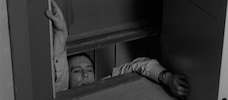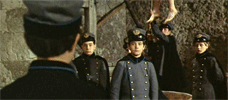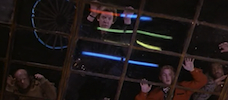Reviews
Louis Malle
Canada / France, 1980
Credits
Review by Glenn Heath Jr.
Posted on 26 November 2010
Source Paramount DVD
Categories Malle Entendu: The Ecstatic, Eclectic Cinema of Louis Malle
Louis Malle’s Atlantic City envisions a fluctuating temporal crossroads, a specific place in between time periods that catches relics of the past and glimmers of the future in the same fluid frame. It’s a film where the wrinkles of an aged man’s face come in direct contact with the smooth contours of a woman’s breast, where dilapidated buildings of a bygone era crumble under the suffocating gaze of postmodern corporate logos growing in stature. It’s clear from the hazy onset: the times they are a-changin’, and Malle makes this conversion in texture and dimension as much a character as any of the restless souls walking the boardwalk. One recurring sign foretells a particularly sage observation - “Atlantic City, you’re back on the map. Again” - mirroring each character’s rejuvenation and reincarnation at the heart of each character’s emotional trajectory.
This elemental overlap of youth and old age dominates Atlantic City from the opening sequence. Worn-out numbers runner Lou takes a break from ironing his tie to look out the cloudy window at Sally, a stunning young woman from the adjacent apartment, drenching her soft skin in fresh lemon juice. This voyeuristic moment captures a certain longing in Lou’s eyes, a nostalgic impulse still driving him out the door and into an aggressively manipulative modern world. Yet as much as Lou wants to move forward, he’s permanently stuck in a whirlpool of old-school patterns, including playing housemaid and gigolo to aging beauty queen Grace, collecting lottery money for a local hood, and hanging out in a dank dive bar drinking whiskey. Sally, on the other hand, is constantly propelled forward by diverse motivating factors, namely her desire to achieve self-sufficiency through employment as a casino dealer and an impending move to Monaco. But Sally’s plans are put on hold by a surprise visit from hippie ex-husband Dave and her now-pregnant younger sister Chrissie, a simple-minded New Age pair who ran off months ago and return toting a bag of stolen cocaine and a load of criminal baggage. This twist darkens the film’s graying vision of transition while shedding doubt on any future possibility of home.
Despite the imminent danger presented by the brutal Philadelphia druglords descending from the north, Atlantic City doesn’t glorify or even emphasize this growing threat hunting Dave and Chrissie. The genre thread almost seems like an afterthought when pressed up against the character’s flowering personalities and eclectic interactions. Instead, Malle allows his characters to spend ample amounts of time together, specifically Dave and Lou, who accidentally meet while the younger man is trying to sell the aforementioned drugs. But the two form a dubious pair, Dave stroking Lou’s ego as a man of importance merely to use him as a courier and scapegoat. When they walk down the wide boardwalk, Lou tries to act tough by showing his disdain for the modern Atlantic City, saying, “it’s all so god damn legal now.” He follows the comment up by casually implying he once had to kill a few men, absolving his guilt by taking a long cleansing dip in the Atlantic. In keeping with Malle’s theme of contradictory relationships between young and old, Lou doesn’t even see that Dave could hardly care less, and these languishing conversations reveal the delusions of grandeur that will come to fruition later in the film.
Amidst the graffiti, boarded-up windows, and empty lots, Lou and Sally’s stories converge, producing a strange love fable that develops within a supply-and-demand criminal undercurrent. Malle drives the couple together through violent circumstance (not surprisingly, Dave is killed quickly), brilliantly deconstructing the standard “protector/victim” relationship by illuminating the striking age motif. This is no more evident then when Lou’s self-important posturing eventually catches up with him. After schmoozing Sally with money he took from shady dealings with Dave, Lou is confronted by the hoods looking for their missing drugs. Stunned by the sudden violence, Lou helplessly watches as they abuse Sally with reckless abandon. The whole experience sends him into a desperate panic, and the elderly man begins muttering “I didn’t protect you” over and over again. Reality has come crashing down, and every inch of Lou’s face tightens up under the pressure of his cracking façade of influence and power.
But Atlantic City is not about the destruction of 1950s era masculinity and class by modern-day thuggery, or even concerned with crime in general. Malle affords Lou revenge, but the act itself isn’t important. It’s the feeling Lou gets after gunning down the two men in defense of Sally, the surprise on his own face that sheds light on Malle’s key themes of redemption. Lou hears the echoes of past experiences, and for the first time blows them away by living in the moment, fully giving in to his fantasies about gangsterdom and experiencing the point of view that has always been just out of reach. When Lou watches the local news coverage of the shootings, his smile feels both awkward and childish at the same time. But there’s also a tangible sense of fatality throughout the film that reveals itself only in these final moments. That both Lou and Sally realize their “love affair” is completely incompatible makes Atlantic City an even wiser film about change, both in terms of character evolution and a shifting sense of place.
If Atlantic City is a cinematic manifesto on the passage of time, it clearly believes old souls are meant to be together long after their perceived expiration dates, and young ones must free themselves from outside burdens and find a specific sense of place. Malle revels in such surprising reversals of fortune and new beginnings, but counter-balances the romanticized elements with a real sense of the deteriorating environment. As the credits roll, Malle frames an old hotel getting pummeled by a wrecking ball, an object of destruction dancing to a hybrid mix-tape of all the classic songs representing the history of Atlantic City. It’s certain all things must go through cycles, and the key to lasting happiness and fulfillment is surviving long enough to see what comes next.
More Malle Entendu: The Ecstatic, Eclectic Cinema of Louis Malle
-

Viva Maria!
1965 -

Elevator to the Gallows
1957 -

Zazie dans le métro
1960 -

William Wilson
1968 -

Black Moon
1975 -

Lacombe, Lucien
1974 -

Atlantic City
1980 -

My Dinner with Andre
1981 -

Crackers
1984 -

God’s Country
1985 -

Vanya on 42nd Street
1994
We don’t do comments anymore, but you may contact us here or find us on Twitter or Facebook.



